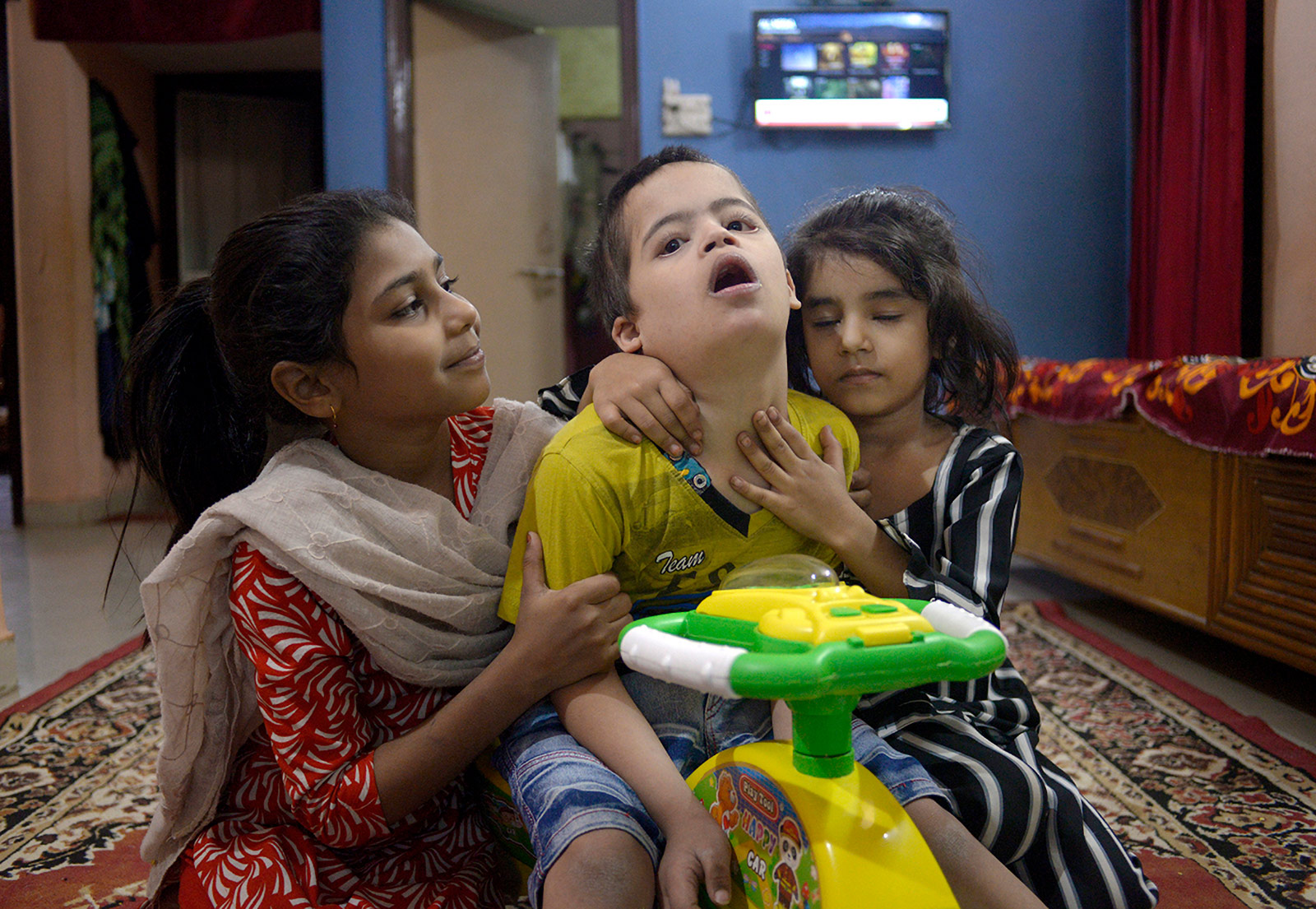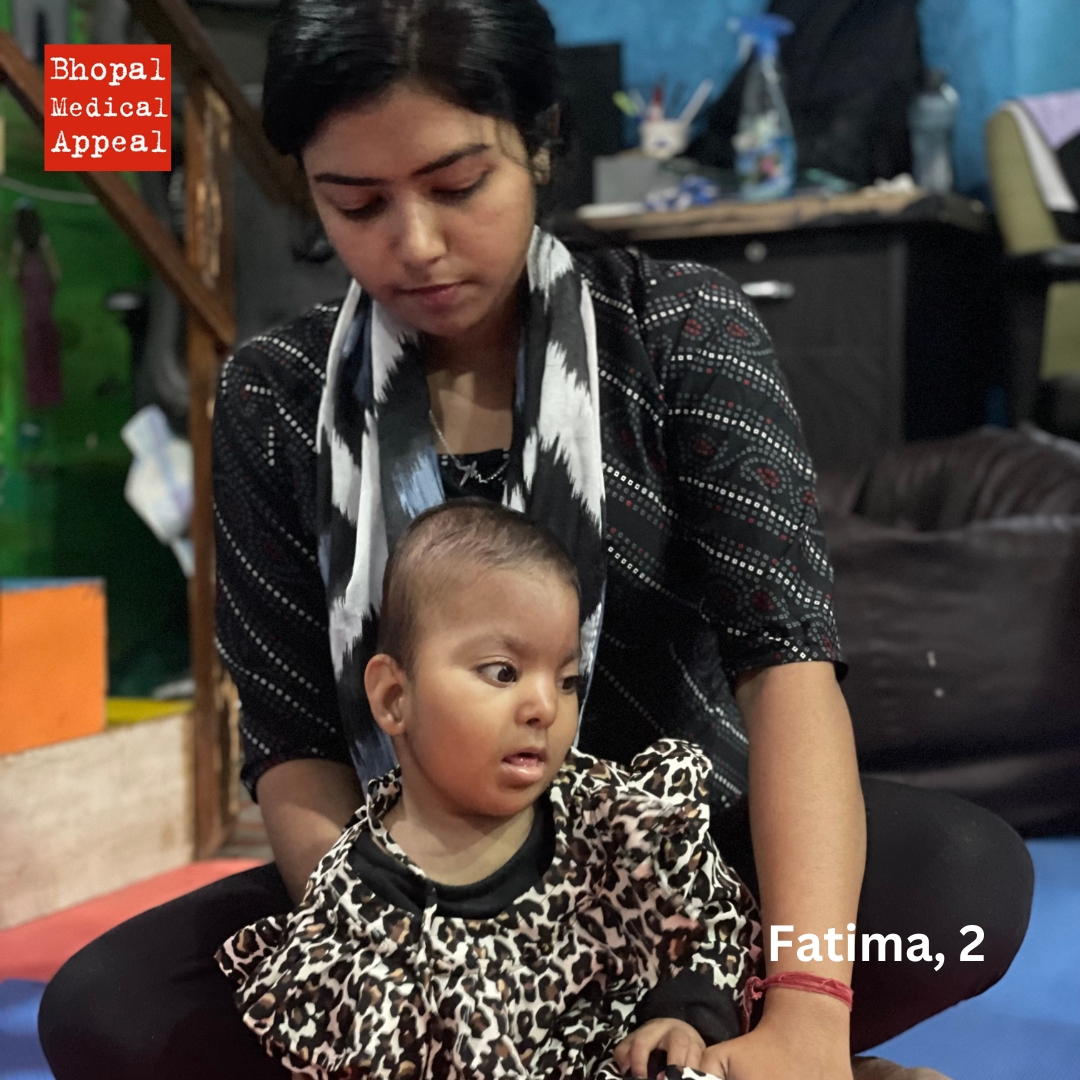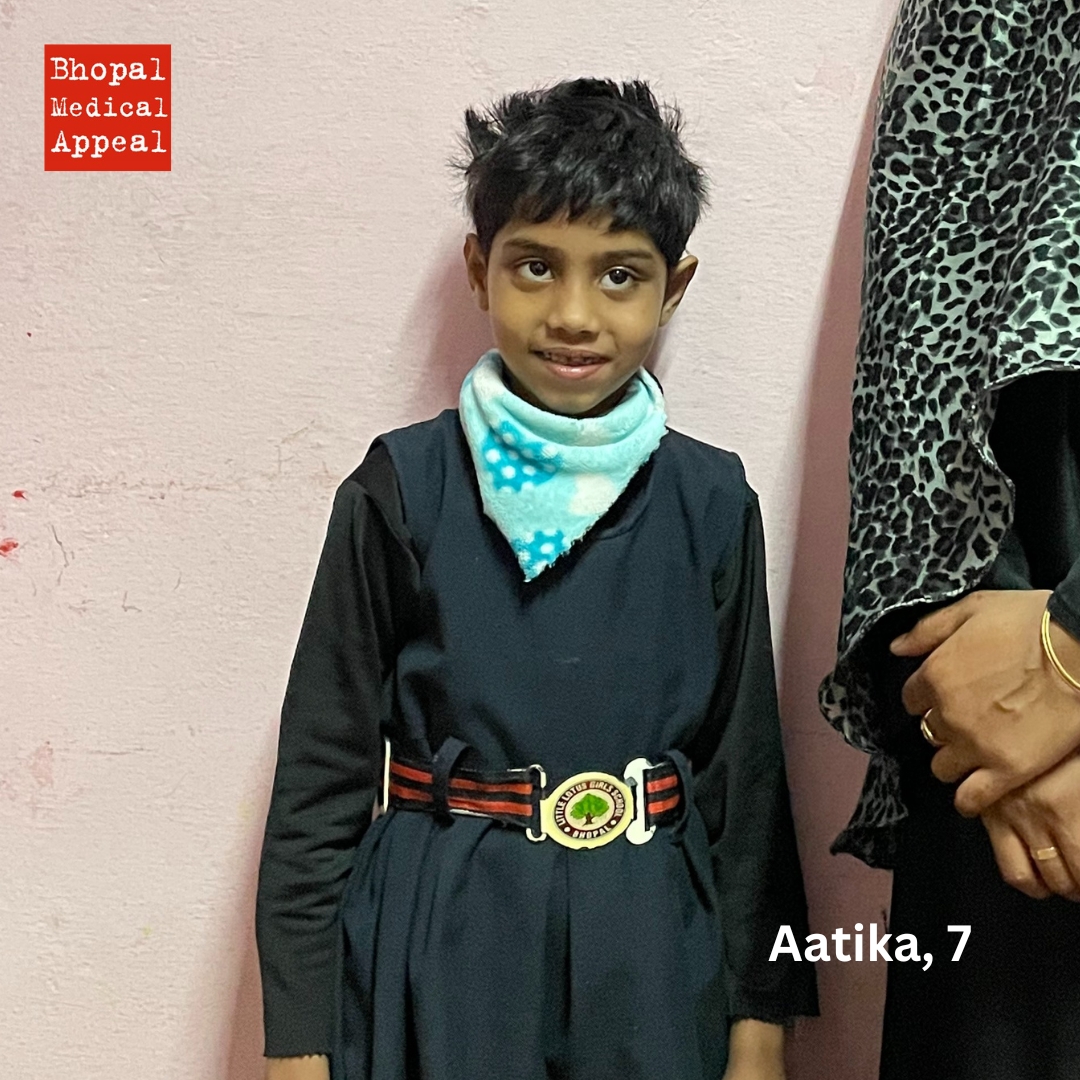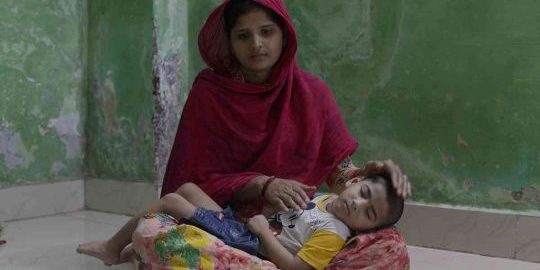Ramadan Chingari Rehabilitation Fund
Fund a child’s rehabilitation at our Chingari clinic this Ramadan and help transform their life. Thanks to our physiotherapists, speech therapists, and special educators, every year more children at Chingari learn to sit, walk, or speak, and face the world’s challenges.

Ramadan Chingari Rehabilitation Fund
Fund a child’s rehabilitation at our Chingari clinic this Ramadan and help transform their life. Thanks to our physiotherapists, speech therapists, and special educators, every year more children at Chingari learn to sit, walk, or speak, and face the world’s challenges.
The Bhopal Medical Appeal is a UK charity that cares for survivors of the world's worst industrial disaster, the 1984 Union Carbide gas disaster in Bhopal, India. We provide free treatment for families poisoned by gas or by toxic chemicals still leaking into water sources in the city, including a third generation of damaged children. These are their stories:

Mohammad’s Story
Mohammad is 7 years old and has cerebral palsy. His paternal grandparents were affected by methyl isocyanate gas during the 1984 Union carbide disaster. Mohammad has been attending the Chingari children’s clinic since 2019, when he was just 21 months old. He was a premature baby and suffers from muscle tightness in all his limbs and a scissoring pattern in his legs, which prevented him learning to sit, stand or walk. The physiotherapists have been working with him to help relieve the muscle tension, and Mohammad has now gained control of his neck movement, improved the function of his hands, and learned to sit independently.
When he came to Chingari, Mohammad had not yet started to talk. With the help of speech therapy, he has learned to speak and communicate well with his parents and teachers. Mohammad has made enormous progress in his education classes over the past few years. To begin with he was withdrawn and had trouble communicating, but his social confidence has increased over time. He now greets the teacher and his classmates and is happy to share and play with the other children. He has learned the alphabet in Hindi and English and is working on his writing. He has learned some poems by heart and can recite them in class. With the help of the occupational therapist, he can now eat and drink with his hands without help, and he picks out his own clothes in the morning and choice of food at lunchtime.
Mohammad enjoys listening to music, especially dance music. He also listens to Qawwalis (a form of devotional Islamic music that originated in Persia and is performed by Sufis). He loves pens and likes to buy new ones when he can and uses them to draw in his notebooks. He wants to become a doctor and likes to put his brother’s school identity card around his neck and tell his mother ‘I’m the doctor and you must take half a tablet in the morning and half in the evening.’

Fatima's Story
Fatima is 2 years old and has dyskinetic cerebral palsy, a condition which causes weakness and involuntary movements in the muscles. Her grandfather is a survivor of the 1984 Bhopal gas disaster, and her father Mashkoor and mother Sana brought her to Chingari for assessment when she was just a year old. Fatima has suffered seizures since birth and also had pneumonia as an infant. When she came to Chingari she was still unable to properly control her neck, resulting in missed physical milestones. She could not yet sit, stand, squat, or perform controlled movements with her hands.
Since beginning physiotherapy, Fatima’s neck muscles have strengthened considerably and she can now control the movement of her head. She has learned to sit cross-legged, can roll on both sides, and can now properly grasp and hold objects. Occupational therapy has also helped her with hand control, eye contact, and the basics of call and response necessary for her to communicate. In speech therapy, Fatima has progressed from being completely non-verbal to communicating via sounds and has managed to speak a few words, like mamma and amma (grandmother). Although progress has been slow due to her young age and the severity of her condition, Fatima is progressing well and should continue to reach important milestones with the right program of care.
Fatima’s favourite food is Sabudana – food made from cassava root. Her paternal grandmother’s name is also Fatima. Talking about Fatima, her grandmother gets emotional and says, “I want Fatima to become capable and well qualified in life and will try my level best to do so. I feel really irritated if anyone talks wrong about her. She is our child, our piece of heart; we accept her the way God has given her to us. I am ready to dedicate my whole life to her.”

Umair's Story
Umair is 5 years old and has cerebral palsy. His mother Sayma’s own mother was exposed to methyl isocyanate gas during the 1984 Union Carbide leak. Umair was born prematurely and suffered hypoxic-ischemic encephalopathy, a brain injury caused by lack of oxygen, at birth. The cerebral palsy caused extreme muscle tightness in his limbs and scissoring in his legs, which affected his mobility during infancy. His parents brought him to Chingari for assessment when he was just over a year old, and the therapists put together a bespoke treatment plan involving physiotherapy, speech therapy, and education.
Umair’s physiotherapy has helped reduce the tightness in his muscles, resulting in improved neck control, improved posture, and better functionality in his hands and legs. He can now sit cross-legged, squat, and kneel with support. When Umair came to Chingari he couldn’t yet speak and struggled with tongue control which made it hard for him to chew and swallow food. The speech therapists have worked extensively with him on this and he has progressed to semi-solid foods. Umair can now speak well at a phrase level, allowing him to communicate with simple sentences. In classes, Umair has learned to count from 1 to 10, identify colours and animals, and speak and write his name.
Umair is an incredibly bright child and happy child but occasionally gets frustrated with his limited mobility. He enjoys being at the centre, particularly the food – rice porridge is his favourite – and he loves blue light, which the therapists use to engage him during treatment. At home he is a big fan of Spiderman and Gattu Chinki cartoons, and when he grows up he wants to own and ride a KTM sports motorcycle. He is learning the Koran and would like to become a Hafiz (know it by heart).

Aatika’s Story
Aatika is 7 years old and has cerebral palsy. Aatika’s father is a survivor of the 1984 Bhopal gas disaster. Her mother Safiya and father Wasim were concerned that the extreme muscle weakness in her limbs would prevent her learning to sit, stand or walk unaided. They first brought her to Chingari for assessment in November 2019. Aatika started physiotherapy and speech therapy, and despite her treatment being interrupted by the pandemic, has made remarkable progress.
In physiotherapy, Aatika’s muscle strength has improved and she can now sit, stand, and walk independently. With the help of the occupational therapist, she has learned to eat and drink with her hands, brush her teeth with help from her parents, and pick out her own clothes. In her classes she has learned to hold a pencil, and she can participate in drawing and other activities and play with the other children. Aatika was unable to speak or produce controlled sounds, but through speech therapy she is learning to control her tongue movement. She can now form individual words but still struggles to pronounce them clearly. The therapists believe this will continue to improve and she will be able communicate well in the future.
Her mother Safiya tells us: “she likes playing with other children but gets upset and feels insulted if someone behaves rudely with her. She never feels bad about her disability […] Although nobody understands what she says, but she keeps on talking. After her birth, we as a family has become more matured and our patience has also increased. Our lives have improved a lot after her birth. We want her to become confident and self-dependent in the future.”

Ankada's Story
Ankada is 20 years old and has been receiving care at Chingari from the age of 6 for hearing impairment. Her late father, Jameel, was a gas survivor.
When Ankada first came to Chingari she was not able to speak. She used signs to communicate and express herself, and her inability to hear meant that she had little understanding of what others were saying to her. The provision of digital hearing aids, audiometric training, and speech therapy at Chingari have been life changing for Ankada. Over time she began to hear and understand what people were saying to her and learned to speak at a level that allowed her to express her needs and feelings with others. Since we shared her story last year, Ankada has completed her course of speech therapy as both her hearing and speaking have reached a level where she no longer struggles to communicate.
Ankada also received special education at Chingari. Before attending, she was not able to go to normal school, as she struggled to write the numbers 1-10 or complete the alphabet. At Chingari she progressed quickly, learning to write the numbers 1-100, do basic maths, create arts and crafts, perform basic computer skills, and write the names of days, months and colours in Hindi and English. Once she could read fluently in Hindi she began attending regular school as well as the clinic. Since last year, Ankada has completed her education at Chingari and now attends regular school in year 10.
Like most young people at Chingari, Ankada loves the food served there, especially the Biryani, pasta and noodles and one day she would like to become an air hostess.

Aksa's Story
Aksa is 8 years old and has been attending Chingari since January 2021. She receives speech therapy, physiotherapy, occupational therapy and attends special education classes. Her grandmother Nafeesa Bee is a survivor of the Bhopal gas disaster. Her father Sabir lives outside Bhopal where he works and her mother Afsana stays with her in the city so she receive treatment.
Prior to receiving physiotherapy, Aksa had an abnormal walking pattern and would frequently fall. Her walking, balance and muscle strength have all steadily improved since starting treatment, and she is able to stand, walk unsupported and kneel better than before. Since last year Aksa has started running, jumping, and is able to participate in games involving throwing, catching and cycling. Since starting speech and occupational therapy, Aksa’s hand function, posture and coordination have all seen significant improvement. When she first arrived at Chingari Aksa was able to speak only a few words, but gradually her confidence and ability have grown. She can now hold conversations and tell and write stories. Perhaps most importantly, occupational therapy has allowed her to master the basic daily life skills she will need for independent living. Since Last year Aksa has continued to progress with her education and can write short words in both Hindi and English. She can write numbers from 1 to 100, knows her two and three times tables, and can solve simple addition problems.
Aksa loves dancing, listening to music and dressing up. She likes spending time in front of the mirror to do her makeup, especially if she attending a wedding. Her favourite meal is Biryani because she loves rice. In the future Aksa would like to join the police.
Aksa’s Story
Mohammad’s Story
Fatima’s Story
Umair’s Story
Aatika’s Story
Ankada’s Story
Aksa’s Story
Mohammad’s Story
Disclaimer: Before you donate, please note that the child rehabilitation fund is not a sponsorship program. By donating you are supporting the care of a child or children at Chingari, but you will not be linked with a specific child. We will provide updates on the progress of all the children’s treatment to our donors throughout their time in our care.
The Blessed Month of Ramadan
Why is The Bhopal Medical Appeal fundraising and raising awareness of the gas disaster and water poisoning with a faith-based campaign?
At The Bhopal Medical Appeal we acknowledge that the Islamic holy month of Ramadan is an extremely important time for the Islamic faith community across the world.
The month of Ramadan is synonymous with charitable giving, and we wish to highlight the incredible efforts and resilience of our registered children, their families, and the staff at Chingari.
Your sadaqah gift this Ramadan will help transform the lives of the children of Bhopal by providing them with long-term care, support and a place in a loving community.
Learn more about the Chingari Children's Clinic
The Chingari Rehabilitation Centre is dedicated to providing free, ethical and sustainable healthcare to congenitally disabled children born into gas and contaminated water affected families in Bhopal.







